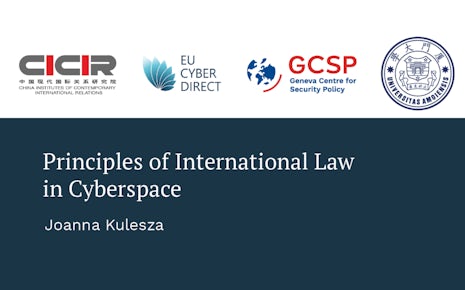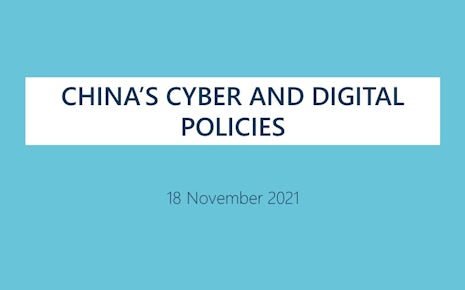Abstract
This paper offers a comprehensive analysis of China’s evolving approach to cyberspace domestically and its efforts to recast debates on cyber diplomacy internationally. It teases out how multifold priorities and foundations, predicated on the notions of the supremacy of the state as the sole guarantor of security in the cyber domain and the primacy of regime security, exhibit themselves in China’s engagement with global cyber norms-building initiatives. It likewise addresses the overarching geopolitical and geoeconomic drivers of Chinese cyber domain policy focused on the restructuring of the economy toward self-reliance and innovation-led growth, the reducing of dependence on foreign technologies to secure and control key supply chains and the enhancing of China’s discursive rulemaking influence. This paper analyses the principal instruments, strategies, and core rhetoric vehicles used to elevate China to a status of a “cyber superpower” in the digital realm. It explains how and why ideas like cyber sovereignty and “information security” are leveraged by the Chinese government in various multi- and minilateral fora to pull other actors closer to its orbit, and into fidelity and acquiescence with its idiosyncratic interpretation of international law, its vision of reforming global Internet governance, and its information security-centric regulatory landscape. In addition, this paper contextualizes China’s efforts at cyber diplomacy against the backdrop of the US-led pushback against Huawei and traces the genesis and evolution of the Sino-European engagement on cyber affairs. Identifying existing knowledge, perception and conceptual gaps, this Digital Dialogue finds signs of China being both a challenger of the status quo and a constructive stakeholder in global cyber debates.
Key points
- The “rise of China” in cyberspace represents much more than the development of a sophisticated state-aligned cyber espionage apparatus. It is in many ways more about the ability of the PRC to transform national companies into champions, and in turn, expand their global reach and competitiveness. China-nexus industrial cyber espionage operations must be contextualized as single – but central – components of a broader state-driven strategy designed to restructure the main drivers of economic growth. The preference for this option is likely going to persist in the near term as increased global pushback against forced technology transfers by China continue to close off other routes of foreign intellectual property acquisition.
- China’s approach to cyber diplomacy is driven by the overarching objective of becoming a “cyber superpower” in the economic, normative, military and commercial realms – one that harnesses the power of digital technologies and innovation to achieve global technological leadership and modernise economic development. State-subsidised plans form the primary basis of accomplishing this but are not the only tools at the one-party regime’s disposal.
- The imperatives of one-party regime’s narrative control – and maintaining social stability and regime continuity – permeate, shape and condition China’s domestic information security-focused approach to cyberspace and its engagement in global cyber initiatives.
- China’s cyber affairs legal and regulatory landscape is sweeping and institutionally complex, consisting of guidelines, plans, opinions, standards focused on cybersecurity, development and capacity building, and has a wide range of stakeholders.
- China’s efforts at cyber diplomacy have become increasingly proactive and global in nature, seeking to promote its institutional power and normative influence over the overall development and governance of cyberspace. China’s diplomatic quest has focused on increasing appeal for China’s vision of cyber sovereignty and building a coalition of like-minded nations favourable to state-centric models of international cyber negotiations and Internet governance.
- China’s political discourse on cyber affairs remains inherently grounded in historic distrust towards the international legal regime and deep-seated tension between China and Western neoliberal interests.
- The official Chinese line regards the application of international humanitarian law as being tantamount to legitimising conflict in the cyber domain, pleading for the demilitarisation of legal approaches to cyber domain. China has expressed support for the principles of the UN Charter and regards sovereignty as a primary rule of international law, advocating for the inherent right of states to administer their domestic cyberspace according to domestic law and political culture.
- The EU’s engagement with China has been primarily focused on socio-economic issues related to cybersecurity, the digital economy, market access reciprocity and intellectual property safeguards. However, as the EU recalibrates its priorities toward China, diplomatic discussions are increasingly going to address more structural issues.
- The disentangling of supply chains with Chinese suppliers risks consolidating digital spheres of influence across the East-West divide. While this might prove beneficial for enhancing Europe’s domestic industrial bases, the decoupling contradicts with broader objectives of compelling structural reforms to the PRC’s state capitalism model and eradicating discriminatory market access policies. In contrast to comprehensive exclusionary measures, the EU’s risk-based and network resilience-based approach to this issue may succeed in addressing both geoeconomic and cybersecurity issues related to Huawei.



